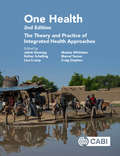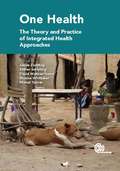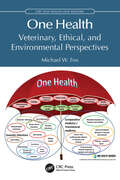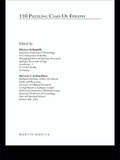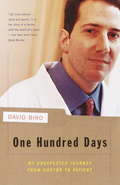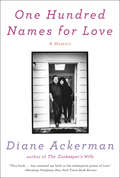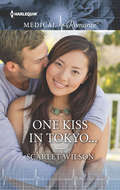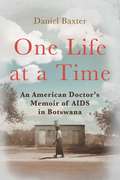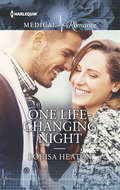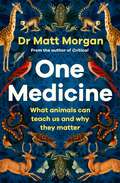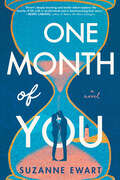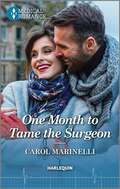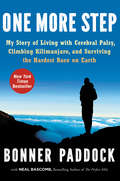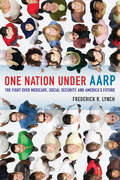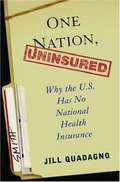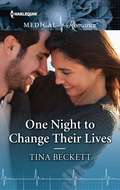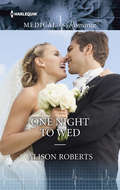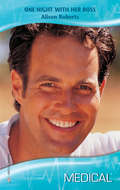- Table View
- List View
One Health: The Theory and Practice of Integrated Health Approaches
by Barbara Jones Paul Coleman Anna Dean David Waltner-Toews Michael Clarke Iain J. Gordon Rea Tschopp Susan Cork Susan C Welburn Karin Hediger Mahamat Bechir Hung Nguyen-Viet Marcel Tanner Solveig Danielsen Professor Craig Stephen Esther Schelling Angela Cassidy Martin Bunch Maxine Whittaker Dennis C Turner Abigail Woods Michael Bresalier Michel de Garine-Wichatitsky Wiku Adisasmito Cécile Aenishaenslin Seid Mohamed Ali Ian Allen Silvia Alonso Vilda Amir Maurizio Aragrande Sara Babo Martins Zolzaya Baljinnyam William Bazeyo Andrea Beetz Jeffrey Bender Mónica Berger-González Benjamin Blair Barry Blakley Massimo Canali Nakul Chitnis Guéladio Cissé Kathryn C. Conlon Lisa Crump Soledad Cuevas Paula Dominguez-Salas Colleen Duncan Kaylee Errecaborde Patricia Farnese Thomas Fries Samuel Fuhrimann Christa A. Gallagher Ratna B. Gurung Felix Hafner Barbara Häsler Jan Hattendorf Joldoshbek Kasymbekov Julia S. Lankton Huong Le Thi Henrik Lerner Michael Mahero Stephanie Mauti Céline Mbilo Hélène Meier Mary Elizabeth Miranda Vi Nguyen-Viet Brigit Obrist Peter Odermatt Anna Okello Christopher A.L. Oura Katharine Pelican Kristina Pelikan Phuc Pham-Duc Sue Pollock Sangay Rinchen Karma Rinzin Felix Roth Johanne Saint-Charles Alexandra Shaw Jonathan M. Sleeman Woutrina Smith Keira Spinner Katharina D. Stärk Arlette C. Szelecsenyi Tenzin Tenzin Jimmy Tickel Karin Tschanz-Cooke Hoang Van Minh Alain Vandermissen Tu Vu-Van Daniel P. Walsh Sylvia Wanzala Lenke Wettlaufer C. LeAnn White Andreas F. Widmer Hind Yahyaoui Christian ZurbrüggOne Health, the concept of combined veterinary and human health, has now expanded beyond emerging infectious diseases and zoonoses to incorporate a wider suite of health issues. Retaining its interdisciplinary focus which combines theory with practice, this new edition illustrates the contribution of One Health collaborations to real-world issues such as sanitation, economics, food security and vaccination programmes. It includes more non-infectious disease issues and climate change discussion alongside revised case studies and expanded methodology chapters to draw out implications for practice. Promoting an action-based, solutions-oriented approach, One Health: The Theory and Practice of Integrated Health Approaches highlights the lessons learned for both human and animal health professionals and students.
One Health: The Theory and Practice of Integrated Health Approaches
by Rea Tschopp Vanessa Racloz Susan Cork Susan C Welburn Bonnie Buntain Bassirou Bonfoh Simon Reid Carol Rubin Karin Hediger Eric Boa David H Cumming Mahamat Bechir Vreni Jean-Richard Hung Nguyen-Viet Solveig Danielsen Andrea Meisser Professor Craig Stephen Angela Cassidy Monique Lechenne Martin BunchThe One Health concept of combined veterinary and human health continues to gain momentum, but the supporting literature is sparse. In this book, the origins of the concept are examined and practical content on methodological tools, data gathering, monitoring techniques, study designs, and mathematical models is included. Zoonotic diseases, with discussions of diseases of wildlife, farm animals, domestic pets and humans, and real-world issues such as sanitation, economics, food security and evaluating the success of vaccination programmes are covered in detail. Discussing how to put policy into practice, and with case studies throughout, this book combines research and practice in one broad-ranging volume.
One Health: Veterinary, Ethical, and Environmental Perspectives (CRC One Health One Welfare)
by Michael W. FoxThis collection of reflective, critical, philosophical, and practical chapters represents the author’s 60 years as a veterinarian, ethologist, and bioethicist. The rising incidence of zoonotic diseases from farmed animals and wildlife in the expanding human population and so-called reverse zoonoses where humans are infecting other species are existential concerns. These concerns are linked with anthropogenic climate change and our impact on ecosystems which threaten biodiversity and the health and future of Homo sapiens and many other species.These interconnected issues are examined in this book, broadening the scope and agenda of what is currently more narrowly practiced as preventive medicine. The author calls for greater emphasis on holistic preventive health-care maintenance in response to the escalating costs of human and companion animal health problems, the welfare of factory farmed animals, and endangered status of many wild species.Our species now faces a complex existential crisis that must be addressed in an interdisciplinary way, because there are multiple contributing factors; factors that call for the insights of science and bioethics. Fearlessly tackling contentious issues and 'wicked problems,' Dr Michael W. Fox offers an integrated perspective of what One Health looks like on the ground.
One Hot Night with Dr. Cardoza (A Summer in São Paulo #3)
by Tina BeckettCan one steamy night……take them to paradise?Physiotherapist Amy Woodell is going to use her time in Brazil to embrace her heritage. She might even let loose while she’s there! Who better to indulge in than her new colleague, sexy ex-footballer turned orthopedic surgeon Roque Cardoza… Only, once she uncovers the passionate man behind the determined bachelor, Amy knows one night—no matter how hot—is never going to be enough!
One Hundred Case Studies in Epilepsy
by Dieter Schmidt Steven C SchachterFrom pediatric to the elderly, from contractible to refractive, epilepsy is an illness that manifests in many forms and across a range of demographics. In this fascinating volume, the author details more than one hundred instances where health care practitioners faced unusual challenges in treating the disease. All aspects of epilepsy are explored
One Hundred Days: My Unexpected Journey from Doctor to Patient
by David BiroIt is a situation we all fear and none of us can imagine: a life-threatening diagnosis. But what if the person receiving the diagnosis--young, physically fit, poised for a bright future--is himself a doctor? At thirty-one David Biro has just completed his residency and joined his father's successful dermatology practice. Struck with a rare blood disease that eventually necessitates a bone marrow transplant, Biro relates with honesty and courage the story of his most transforming journey. He is forthright about the advantages that his status as a physician may have afforded him; and yet no such advantage can protect him from the anxiety and doubt brought on by his debilitating therapies. The pressures that Biro's wild "one hundred days" brings to bear on his heretofore well-established identity as a caregiver are enormous--as is the power of this riveting story of survival.
One Hundred Names for Love: A Memoir
by Diane AckermanFinalist for the Pulitzer Prize Finalist for the National Book Circle Critics Award "A testament to the power of creativity in language, life--and love." --Heller McAlpin, Washington Post No other writer can blend the science of the brain with the love of language like Diane Ackerman. In this extraordinary memoir, she opens a window into the experience of wordlessness--the language paralysis called aphasia. In narrating the recovery of her husband, Paul West, from a stroke that reduced his vast vocabulary to a single syllable, she evokes the joy and mystery of the brain's ability to find and connect words. Deeply rewarding to readers of all kinds, Ackerman has given us a literary love story, accessible insight into the science and medicine of brain injury, and invaluable spiritual sustenance in the face of life's myriad physical sufferings.
One Kiss in Tokyo...
by Scarlet WilsonOne explosive meeting... Air Force doctor Captain Avery Flynn is literally knocked off his feet by feisty nurse Katsuko Williams. Avery's posting in Tokyo is only temporary-he's well aware nothing lasts forever-and yet he's powerless to resist the attraction between them... One unforgettable kiss! Avery's desire for adventure is thrilling, and it tempts Katsuko to break her no-dating rule. But his earth-shattering kisses leave her wanting more than commitment-shy Avery can offer her. Can Katsuko be the one woman to tame this restless wanderer?
One Life at a Time: An American Doctor's Memoir of AIDS in Botswana
by Daniel BaxterWhen Dr. Daniel Baxter arrived in Botswana in 2002, he was confident of the purity of his mission to help people with AIDS, armed with what he thought were immutable truths about life—and himself—that had been forged on his AIDS ward in New York City ten years earlier. But Baxter’s good intentions were quickly overwhelmed by the reality of AIDS in Africa, his misguided altruism engulfed by the sea of need around him. Lifted up by Botswana’s remarkable and forgiving people, Baxter soldiered on, his memorable encounters with those living with AIDS, and their unfathomable woes assuaged by their oft-repeated “But God is good,” profoundly changing the way he thought about his role as a doctor. Now, after caring for innumerable AIDS patients for eight years in Botswana, Baxter has written an urgent, quietly philosophical account of his journey into the early twenty-first century’s new heart of darkness: AIDS in Africa, where legions desperately struggled to be among the spared and not the doomed. Part memoir, part travelogue, part chronicle of the zaniness of Botswana (one of the questions on his driver’s license application was “Are you or have you ever been an imbecile?”), and part witness to suffering unknown to most Americans, his testimony is an unforgettable tribute to the many people he cared for. Join Baxter on his life-changing journey in Botswana, as he recounts the stories of people like Ralph, a deteriorating AIDS and cancer patient who nonetheless always wore a smile, or Precious, a woman found sick and abandoned in the capital’s slum, or “No Fear,” a rude man in Baxter’s gym whose descent he halted. After many years on the front lines of the African pandemic, Baxter realized that “one life at a time” was the only way to fight AIDS.
One Life-Changing Night
by Louisa HeatonA kiss to mean forever? For ER nurse Naomi Bloom, a handsome man only spells bad news. So when she's forced to move in with her gorgeous new boss, Dr. Tom Williams, she is certain he's strictly off-limits! Tom swore he'd never love again after losing his wife. But Naomi's presence is a breath of fresh air, and Tom finds his long-held vow challenged. Will he be ready to embrace the risk when one kiss leads to a night these two will never forget?
One Magical Christmas
by Carol MarinelliER Consultant Angus Maitlin has just discovered that he's facing his first Christmas as a single dad. Usually cool and confident, he is dreading breaking the news to his two kids. . . Single mum and midwife Imogen is alone this Christmas, and is filling the long hours with double-shifts. Working with Angus on one of the toughest cases she's ever been assigned, she thinks the consultant seems unflappable. But as the night gets harder she gets to know the man behind the professional façade. . . They are far from suited--not to mention having three kids between them! But as the magic of Christmas weaves its spell Imogen and Angus begin to dream that their patchwork family can work. . . and prove this love story is not just for Christmas--it's for life!
One Medicine: How understanding animals can save our lives
by Dr Matt MorganIt all started with a Hob Nob. As Dr Matt Morgan, an intensive care consultant, examined a patient who had suffered a cardiac arrest after inhaling some biscuit crumbs, he saw a flock of birds fly past the window. They must inhale objects all the time when flying, how do they survive? he thought to himself. This began an investigation that spanned continents, species and millennia. For animal science has so much to teach us about human medicine. While some of the overlaps and parallels are obvious – we know how much DNA we share with primates, the first pig heart has been transplanted into a human – there is so much more that we have learnt from the animal world. For example, studying kangaroos, in particular the female&’s three vaginas, has improved in-vitro fertilisation success rates. Watching how a giraffe breathes can help save the life of someone struggling with asthma. Investigating why birds that live in the frozen Arctic circle don&’t freeze to death led to advances with treating hypothermia. Getting a ECG on the 150kg heart of a humpback whale was instrumental to keeping patients with cardiac failure living longer. We owe animals so much, it&’s time to focus on examining how they live and what we still have to learn from them. Better shared understanding of how our species coexists with millions of others can lead to untold medical advances, help both humans and animals and improve the world for all creatures from single-celled bacteria to a 30,000 kg whale. Who knows, maybe a kiss from a frog will save your life?
One Month of You: A Novel
by Suzanne Ewart"Charming yet serious…Fans of complex characters in romance will be intrigued." —BooklistA Walk to Remember meets Jojo Moyes in a stunning love story following one woman who has already seen how her story will end and the one man determined to change it...When Alec asks Jess out, she knows it won't work. Is Alec charming? Of course. Attractive? Definitely. Can she not stop thinking about him…yes, but that's also the problem. Because Jess has rules. And the first? Don't fall in love.What no one knows is that Jess has inherited Huntington's disease from the mother that she cares for. And while witnessing her own future play out, Jess has learnt to keep everyone and everything at arm's length. But Alec is determined to break down those barriers. When she finally tells him why they have no future, he proposes a different option—just one month together.One month to date. One month to live. One month to fall in love.But as Jess grows closer to Alec, she knows she has to end it. It's better that he is hurt now rather than heartbroken later, isn't it?A tearjerker of a novel covering love in all its forms, this tender debut is the perfect next read for fans of Jill Santopolo, Tracey Garvis Graves, and Colleen Hoover."A poignant book with the most beautiful love story at its heart. It looks at how hard it is to care for someone with a degenerative illness while trying to live your own life. Loved it!" - Caroline Khoury, author of It Must Be Love
One Month to Tame the Surgeon
by Carol MarinelliA nurse&’s world is turned upside down when she discovers her new colleague…is her teenage crush! Will their connection be mutual this time? Find out in Carol Marinelli&’s latest Medical Romance… THE ONE THAT GOT AWAY… Nurse Pippa Westford is shocked when charismatic surgeon—and her secret teenage crush—Luke Harris starts working at her hospital. The distraction he unknowingly provided back then helped Pippa survive the tragic loss of her sister, except now he doesn&’t even recognize her. Yet their chemistry ignites instantly, and is completely inescapable! But Luke is only in London for a month, unless Pippa can tame the man who&’s barricaded his emotions for so long…From Harlequin Medical: Life and love in the world of modern medicine.
One More Step
by Neal Bascomb Bonner PaddockIn 2008, Bonner Paddock summited 19,341-foot-high mount kilimanjaro, the world's tallest freestanding mountain. Four years later, he earned the elite triathlete title kona Ironman. Thousands have done each individually. Bonner is the first person with cerebral palsy to do both.Bonner Paddock grew up just wanting to be ordinary. Despite his skinny legs and habit of tripping over nothing, he fought to keep up with his athletic older brothers, learned to battle riptides with his grandfather on close watch, and did everything he could to feel like a regular kid, even when it became clear he wasn't. After being diagnosed with cerebral palsy at age eleven, Bonner didn't let it limit him--instead he simply ignored its existence. For the next eighteen years, he guarded the truth about his health, building a normal life and keeping his secret from everyone--most of all himself.But the sudden death of a friend's young son named Jake, a boy who also suffered from cerebral palsy, forced Bonner to reevaluate who he was. No longer content striving for normal, he began to pursue one breathtaking experience after another in Jake's memory, never hiding from his physical limitations and, in the process, raising international awareness about cerebral palsy. T is appetite for challenges led him to the foothills of Mount Kilimanjaro where, pushing his fragile body to the brink and barely surviving, he braved one mountain only to discover that he still had farther to climb.Embracing his weaknesses to understand his strengths, he then pursued the ultimate adventure: testing his mind, body, and will at the Ironman in Kona, Hawaii, a race regarded by many as the hardest on earth. Along the way he forged a renewed bond with his family and launched a foundation to help disabled children in Africa and at home.In the end, his remarkable journey took him across the globe and introduced him to a compelling cast of characters--from Tanzanian mountain guides to top-class surgeons, to disabled children, to champion athletes--all of whom inspired his quest. Infused with his irresistible charisma, courage, and heart, and illustrated with sixteen pages of color photos, One More Step is a gripping story of human perseverance that demonstrates how our lives are not defined by limits, but by the moments and lessons that push us past them.
One Nation under AARP: The Fight Over Medicare, Social Security, and America's Future
by Frederick R. LynchThis book provides a fresh and even-handed account of the newly modernized AARP (formerly the American Association of Retired Persons)--the 40-million member insurance giant and political lobby that continues to set the national agenda for Medicare and Social Security. Frederick R. Lynch addresses AARP's courtship of 78 million aging baby boomers and the possibility of harnessing what may be the largest ever senior voting bloc to defend threatened cutbacks to Social Security, Medicare, and under-funded pension systems. Based on years of research, interviews with key strategists, and analyses of hundreds documents, One Nation under AARP profiles a largely white generation, raised in the relatively tranquil 1950s and growing old in a twenty-first century nation buffeted by rapid economic, cultural, and demographic change. Lynch argues that an ideologically divided boomer generation must decide whether to resist entitlement reductions through its own political mobilization or, by default, to empower AARP as it tries to shed its "greedy geezer" stereotype with an increasingly post-boomer agenda for multigenerational equity.
One Nation, Uninsured: Why The U.s. Has No National Health Insurance
by Jill S. QuadagnoEvery industrial nation in the world guarantees its citizens access to essential health care services--every country, that is, except the United States. In fact, one in eight Americans--a shocking 43 million people--do not have any health care insurance at all. One Nation, Uninsured offers a vividly written history of America's failed efforts to address the health care needs of its citizens. Covering the entire twentieth century, Jill Quadagno shows how each attempt to enact national health insurance was met with fierce attacks by powerful stakeholders, who mobilized their considerable resources to keep the financing of health care out of the government's hands. Quadagno describes how at first physicians led the anti-reform coalition, fearful that government entry would mean government control of the lucrative private health care market. Doctors lobbied legislators, influenced elections by giving large campaign contributions to sympathetic candidates, and organized "grassroots" protests, conspiring with other like-minded groups to defeat reform efforts. As the success of Medicare and Medicaid in the mid-century led physicians and the AMA to start scaling back their attacks, the insurance industry began assuming a leading role against reform that continues to this day. One Nation, Uninsured offers a sweeping history of the battles over health care. It is an invaluable read for anyone who has a stake in the future of America's health care system.
One Night That Changed Her Life
by Emily ForbesThe midwife's pregnancy shock! From the moment she sees Dr. Xavier O'Donnell, midwife Brighde Campbell knows how the night will end. In the gorgeous obstetrician's arms, she can forget the closely kept reason she avoids commitment-but then she discovers she's pregnant... Finding out he's going to be a father both shocks and delights Xavier, but Brighde seems intent on shutting him out. Her painful secret will test both their hearts, but can he convince Brighde that no matter what the future holds, they can face it together?
One Night With A Billionaire: Billionaire Boys Club 6 (Billionaire Boys Club)
by Jessica ClareFans of J.S. Scott, Louise Bay and Melody Anne - prepare to be dazzled by Jessica Clare's Billionaire Boys Club.The Billionaire Boys Club is a secret society of six incredibly wealthy men who have vowed success in business - at any cost. But success when it comes to love is a different matter...Kylie may be a makeup artist to the stars, but she knows what it feels like to be overshadowed. Especially by her famous boss, the pop star Daphne. That's why she's stunned - and delighted - when one night at a party, she attracts the attention of a gorgeous stranger. But when Daphne decides she wants the handsome billionaire for herself, Cade Archer is suddenly off-limits for Kylie...Cade has known Daphne for years, and always wondered if she might be the right woman for him - even though she never gave him the time of day. But one sizzling night with Kylie has changed everything. So why is she suddenly avoiding him? Fortunately Cade is determined to get what he wants, and he'll do anything to show Kylie she can get everything she wants too...Want more irresistible romance? Look for the rest of Billionaire Boys Club titles, starting with Stranded With A Billionaire, as well as the sizzling spinoff series, Billionaires and Bridesmaids, starting with The Billionaire And The Virgin.
One Night in New York
by Amy RuttanScandal in the city! Arriving in New York, renowned surgeon Mindy Walker is looking forward to a fresh start in the city. So she definitely doesn't expect to find herself working alongside last night's very uncharacteristic one-night stand-gorgeous resident Dr. Sam Napier! Unknowingly sleeping with his new boss is catastrophic for Sam-he's determined to become a successful pediatric surgeon on his own merit, and if this scandal gets out it could ruin both their careers! But as the fiery sparks continue to fly, resisting one another becomes practically impossible...
One Night to Change Their Lives: One Night To Change Their Lives / Friend, Fling, Forever? (Mills And Boon Medical Ser.)
by Tina BeckettCan their surprise baby…Heal his broken heart?Since hospital administrator Garret Stapleton lost both his wife and daughter, he’s determined not to give away his heart again. Until gorgeous but guarded ER doc Addy Santini gets under his skin… Soon they embark on a scorching affair that has unexpected, life-changing consequences! When Garret’s tragic past threatens their happiness, can Addy’s surprise pregnancy lead them to their happy-ever-after?“Really everything about this story was captivating from the wonderful main characters to the riveting dialogue to the fast-paced and entertaining plot.”— Harlequin Junkie on Tempted by Dr. Patera“This was a highly emotional but entertaining read that had me smiling and almost in tears at various times throughout….”— Harlequin Junkie on The Doctors’ Baby Miracle
One Night to Forever Family (Mills And Boon Medical Ser.)
by Meredith WebberThe baby she always hoped for…The family she never expected!Dr. Sam Reilly can’t believe it. She’s standing face-to-face with Andy Wilkie, her late husband’s best friend—and her new boss! Sam cut ties with Andy years ago. But for their patients’ sake, they must learn to work together. They just didn’t expect to learn that, maybe, they might want to be more than just colleagues! A temptation that leads to one baby bombshell…From Harlequin Medical: Life and love in the world of modern medicine.
One Night to Sydney Wedding (Jet Set Docs)
by JC HarrowayFrom one night to discovering they&’re colleagues, a pregnancy and then a marriage on the horizon—is this really what the doctor ordered to heal a heartbreak? Find out in this Jet Set Docs story by JC Harroway! FROM NO STRINGS TO CONVENIENT RINGS! Arriving in Sydney, English doctor Gigi Lane has left her broken engagement, her best friend&’s betrayal and a heap of hurt behind her. A hot fling with a stranger is exactly what she needs! Only when she takes up her temporary stint as an ED doc does she discover she&’ll be working with her heartthrob hookup, surgeon Dante Scott—and she&’s pregnant with his baby! With just two months until her visa expires, Dante tells her there&’s only one acceptable solution…and it starts at the altar!From Harlequin Medical: Life and love in the world of modern medicine. Jet Set Docs
One Night to Wed
by Alison RobertsDr. Felicity Slade has come to the small coastal town of Morriston for a quieter life--and to distance herself from the gorgeous paramedic Angus McBride. She's always known that Angus thrives on the drama and danger of his job with the Specialist Emergency Response Team, and she has never been able to cope with the fear of losing him. The last thing she expects now is to be plunged into a critical emergency situation. When Angus turns up as part of the medical response team, her feelings are thrown into confusion. As they battle through the night to save the lives in their care, it becomes clear to Angus that this is his last chance--he has this one night to prove to Felicity that he really is the right man for her.
One Night with Her Boss
by Alison RobertsTama James has gotten where he is in life through sheer hard work. He's outraged to discover the newest member of his helicopter paramedic team is his superior's daughter. Tama plans to show the pampered "princess" how tough this job really is. Mikayla Elliot proves herself to be bright, strongwilled and a qualified doctor--everything Tama thought she wouldn't be. He's impressed. Mikki, however, is devastated to learn she didn't get the job on merit. Now Tama must show her how much he truly wants her on his team. . . and in his life.
